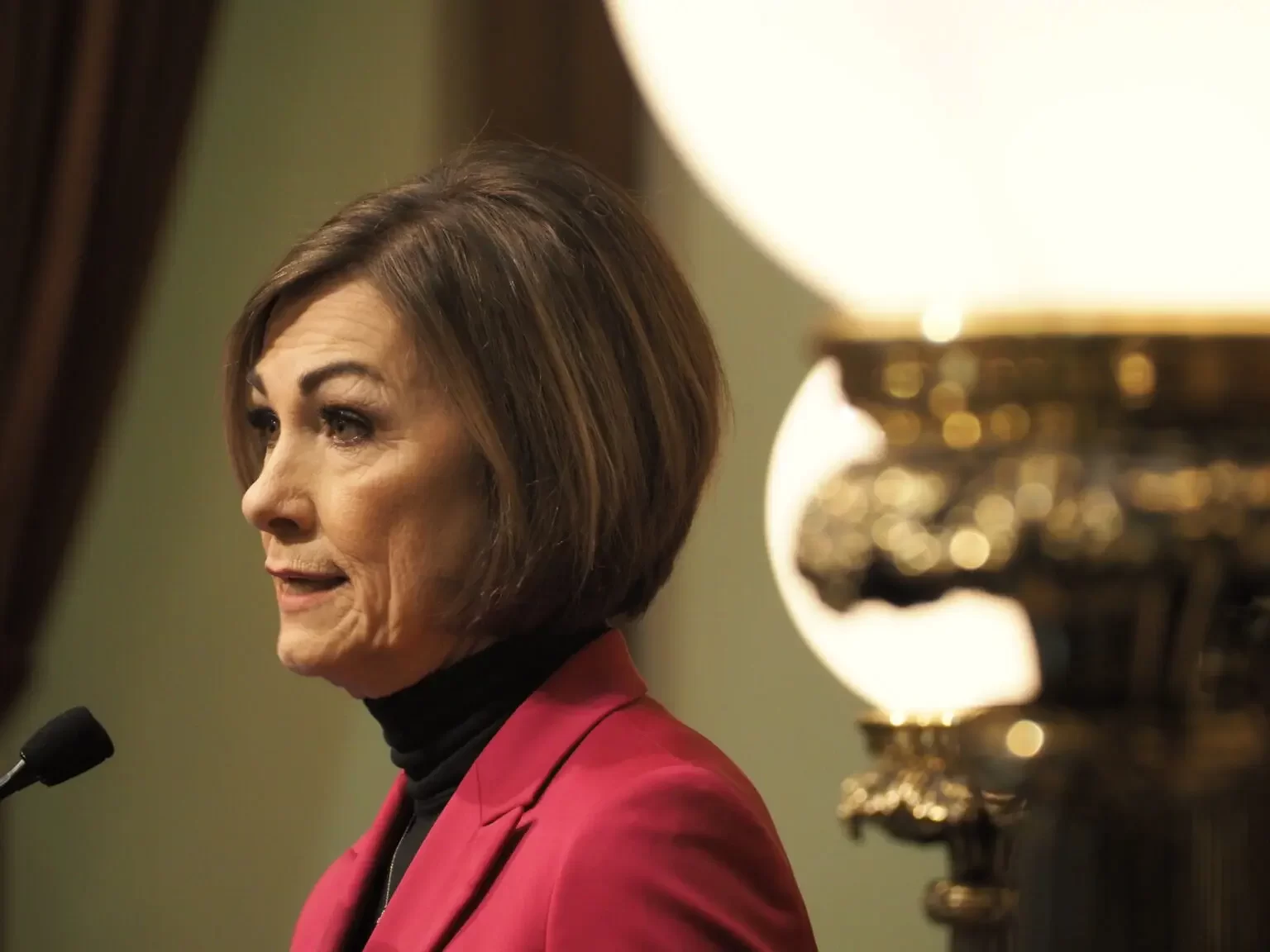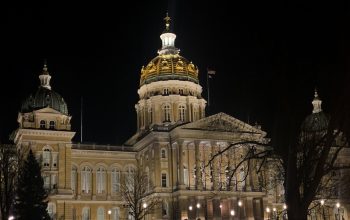 Gov. Kim Reynolds, shown here delivering the Condition of the State message on Jan. 14, 2025, signed bills including school funding, fireworks rules and lawsuit protections in First Amendment cases. (Photo by Robin Opsahl/Iowa Capital Dispatch)
Gov. Kim Reynolds, shown here delivering the Condition of the State message on Jan. 14, 2025, signed bills including school funding, fireworks rules and lawsuit protections in First Amendment cases. (Photo by Robin Opsahl/Iowa Capital Dispatch)
by Robin Opsahl,
Gov. Kim Reynolds signed 25 bills into law Monday, including measures related to fireworks, school funding and First Amendment rights.
The slate of bills signed is the first action on legislation Reynolds has taken since the 2025 legislative session adjourned Thursday. However, these are not the first bills she has signed this year — the governor has already signed into law several measures, including high-profile laws like the ban on using cellphones while driving outside of handsfree or voice-activated modes, and the removal of gender identity from the Iowa Civil Rights Act.
There are still many other measures awaiting Reynolds’ signature that passed this session. The governor has until June 14 — 30 days from the end of session — to sign bills passed this year into law. Measures she does not sign during this period are considered a “pocket veto” and do not become law.
Here are some of the bills Reynolds signed Monday:
K-12 public school funding
Iowa lawmakers sent Reynolds Senate File 167, the State Supplemental Aid (SSA) rate for the 2025-2026 school year, in April. The legislation came to the governor much later than in many previous years — the Legislature has a self-imposed deadline to pass the SSA rate for the upcoming school year within 30 days of the governor’s budget being released in January, though there is no penalty for failing to meet this target.
This year, House and Senate Republicans reached an agreement setting the SSA rate for the upcoming school year at 2%, an increase of $157 per K-12 student for the per-pupil funding mechanism for Iowa schools. The bill also included some funding components for Iowa schools that Republicans said will help address inequities with rural school district funding, including a $5 bump to the State Cost Per Pupil (SCPP) and a 5% increase to the rate of funding per pupil to the transportation equity fund.
Democrats said the 2% rate will not provide enough funding for schools, saying that 159 Iowa school districts will be on the budget guarantee for the upcoming school year — a process that increases local property taxes when school districts’ funding needs are not met by state aid.
Anti-SLAPP protections
The governor also signed House File 472 into law, a measure targeting “strategic lawsuits against public participation,” also known as SLAPP lawsuits. SLAPP cases are civil lawsuits filed by businesses, individuals or organizations against news organizations and activists that are typically a means to try to silence these entities from publishing stories or making public statements about a specific topic. The lawsuits are not filed necessarily with the intention to win in court, but as a means to draw down time and money from the people being sued to prevent them from continuing to report or talk about a subject.
The law is a way to provide protections for defendants in these cases by giving courts the ability to grant expedited relief in cases involving First Amendment rights, like the freedoms of speech and press.
This is a bill that has come up in multiple previous legislative sessions, but did not receive Senate approval until this year. Discussions in Iowa started on SLAPP lawsuits after a 2018 case in which a Carroll police officer sued the Carroll Times Herald when the newspaper reported he had sexual relationships with teenagers — information the officer confirmed was true. The judge had dismissed the lawsuit, but the Carroll Times Herald accrued more than $100,000 in legal fees, nearly putting the paper out of business.
Local restrictions on fireworks
Senate File 303 prevents Iowa cities and counties from prohibiting or limiting the use of fireworks on July 3, 4 and Dec. 31.
Iowans must still follow state laws regulating the use of fireworks, like a ban on fireworks sales to minors or the use of “display” fireworks without local permission, during these three days. However, other further restrictions could not be set by local jurisdictions.
Several cities in Iowa, like Des Moines, Ames and Iowa City, have more restrictions or total bans on the use of fireworks that would no longer be enforceable on these three days. Local rules could still be enforced during other periods when fireworks are permitted for legal use by the state — from June 1 through July 8 and Dec. 10 through Jan. 3 of each year.
During floor debate on the bill, Republican lawmakers supporting the measure said this change was necessary to allow Iowans to fully participate in the the country’s 250th anniversary, referring to President Donald Trump’s idea to begin celebrations at the Iowa State Fair for the “Great American State Fair” from Memorial Day 2025 to July 4, 2026.
Iowa Capital Dispatch is part of States Newsroom, a nonprofit news network supported by grants and a coalition of donors as a 501c(3) public charity. Iowa Capital Dispatch maintains editorial independence. Contact Editor Kathie Obradovich for questions: info@iowacapitaldispatch.com.







